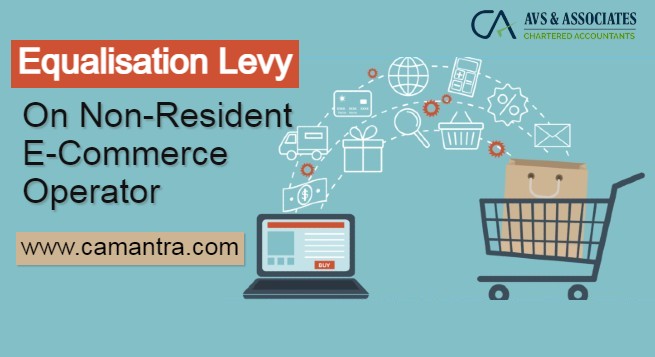The e-commerce businesses are growing broadly, vastly and exponentially; impact digital economy and all of us. The digital economy would cover within their ambit, numerous things like online subscription-based services, online sale of goods/ services/ software, online gaming, hotel/flight booking etc. Taxation of cross border ecommerce transactions has been a challenge for the entire world, including India, as there are various issues with taxing like transactions due to location of the supplier being outside taxable jurisdiction, characterizing the nature of transaction (goods or service), administrative challenges in tracking, absence of physical presence and collecting taxes and various others. In order to bring this kind of cross-border e-commerce transactions into the tax net, India has recently vastly expanded the coverage of “Equalisation Levy” w.e.f. 1 April 2020. The Finance Act, 2020 has amended the provisions of Equalisation Levy and broadened their scope to introduce levy on e-commerce supply or services at the rate of 2% facilitated by a non-resident e-commerce operator.
The literal reading of Section 165A of the Income Tax Act, 1961 (‘Act’) Finance Act, 2016 suggests that the 2020 Levy is to be charged on the entire consideration which is received by the e-commerce operator from e-commerce supply or services .
Equalisation Levy was introduced vide of Finance Act 2016- Chapter 8 to levy “Equalisation Levy” on the Non-residents who were providing online advertisement services or digital advertising services in India without having any permanent establishment in India w.e.f. 1st June, 2017. It was taxable when services were provided to persons resident in India or a non-resident having permanent establishment in India.
The Government of India (GoI) has broadened the equalisation levy’s scope from 01.04.2020 to include e-commerce sales of goods & services provided by non-resident operators to Indian customers.
The equalisation levy is imposed at the rate of 2% on the considerations received or receivable by the non-resident e-commerce operators. For the period April to June 2020, the 1st quarter filing of the equalisation levy for qualifying e-commerce operators is due by 07.07.2020. It is essential to adhere to this new compliance obligation in India to avoid penalties and interest.
What are the Provisions?
E-commerce supply or service has been described in the provision of ESS Equalisation levy to mean online sale of goods or services.
Equalisation Levy is also applicable if the consideration is received by the operator from a non-resident for:-
- Sale of advertisement who is targeting an Indian resident or a customer who accesses the advertisement via IP( internet protocol )address located in India and
- Sale of data, collected from an Indian resident in India or where the non-resident avails the supply or service using an IP address located in India. E-commerce operator has been described as a non-resident who owns, operates or manages digital platform for sale of goods or online provision of services or both online.
ESSEqualization Levy is not applicable where the consideration is related to permanent establishment of the e-commerce operator or subject to advertising EL (applicable at the rate of 6% in such cases) or is less than Rs.20 million PA (per annum).
What is the Nature of Equalization Levy – Whether it is a Direct Tax or Indirect Tax?
As Equalization Levy brought into force w.e.f. 1st April 2020 has a borad tax base i.e. it covers all “electronic commerce supply or services”, it is essential to analyze the nature of this tax. There is a lot of debate on whether the same is a direct tax or an indirect tax and this is important to analyze. It should be noted that the Equalization Levy on e-commerce supply or services is different from the Equalization Levy which was introduced in April 2016 which sought to tax e-advertisement services.
Annual Return by E-commerce Operator under Equalisation Levy
A non-resident e-commerce operator is also required to an annual return filling in Form No. 1 alongith periodical payment of equalisation levy. This form no. 1 is for Statement of Specified Services or E-Commerce Supply or Services”. Form No. 1 should be verified electronically under digital signature or electronically via electronic verification.
In case of advertisement service, recipient of service was responsible for deduction of EL from payment to be made to non-resident for online advertisement service and recipient of service was liable for payment and annual return filing.
However, in case of e-commerce operators who are non-resident are themselves needed to file annual returns. As per Point No. 3 of Form No.1, Permanent Account Number (“PAN”) or Aadhar Number is mandatory to be provided. Thus, all non-resident e-commerce operators are required to obtain PAN under Income Tax Act.
Form No. 1 should be furnished by 30th June of the following FY (financial year).
Exclusions to Equalisation Levy
Where an e-commerce operator who is providing e-commerce supply or services, has a fixed place PE in India & such e-commerce supply or services is effectively connected with such fixed place PE in India;
EL is excluded where the Equalisation Levy is chargeable under other specified services like online advertisement or provision of digital advertising space under the Indian laws
EL is excluded when Turnover/ Sales/ gross receipts from e-commerce supply or services are less than Rs.20 million during the previous year.
Income subject to Equalisation Levy will be tax exempt under other provisions of the Indian Income Tax Act from financial year 2021-22.

